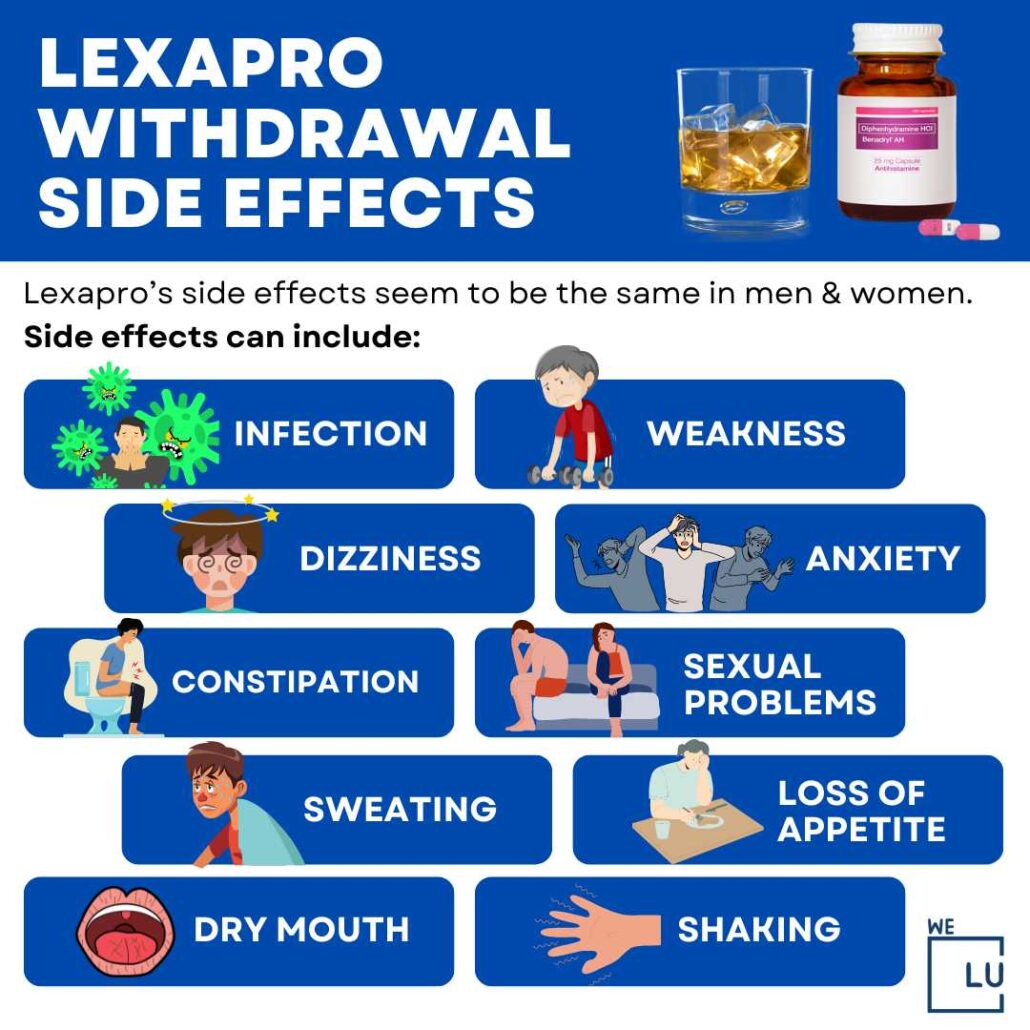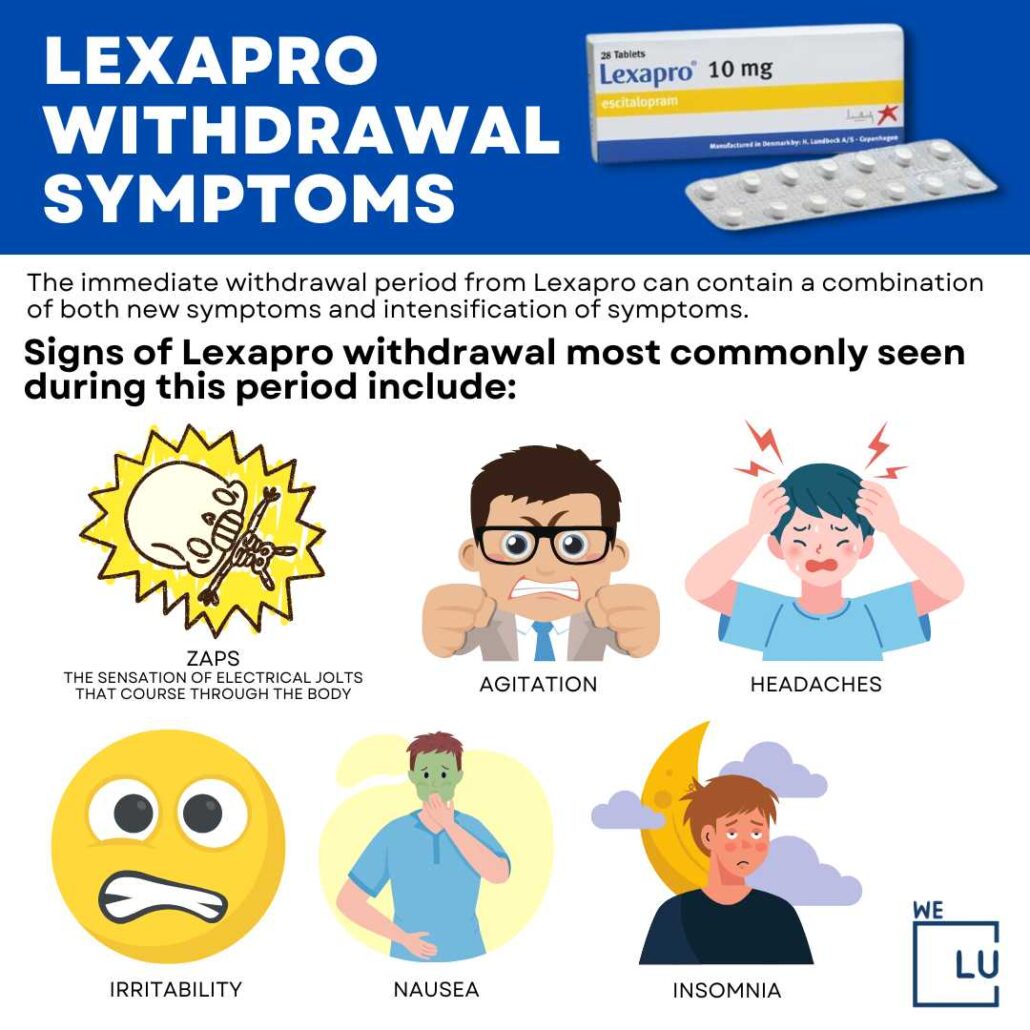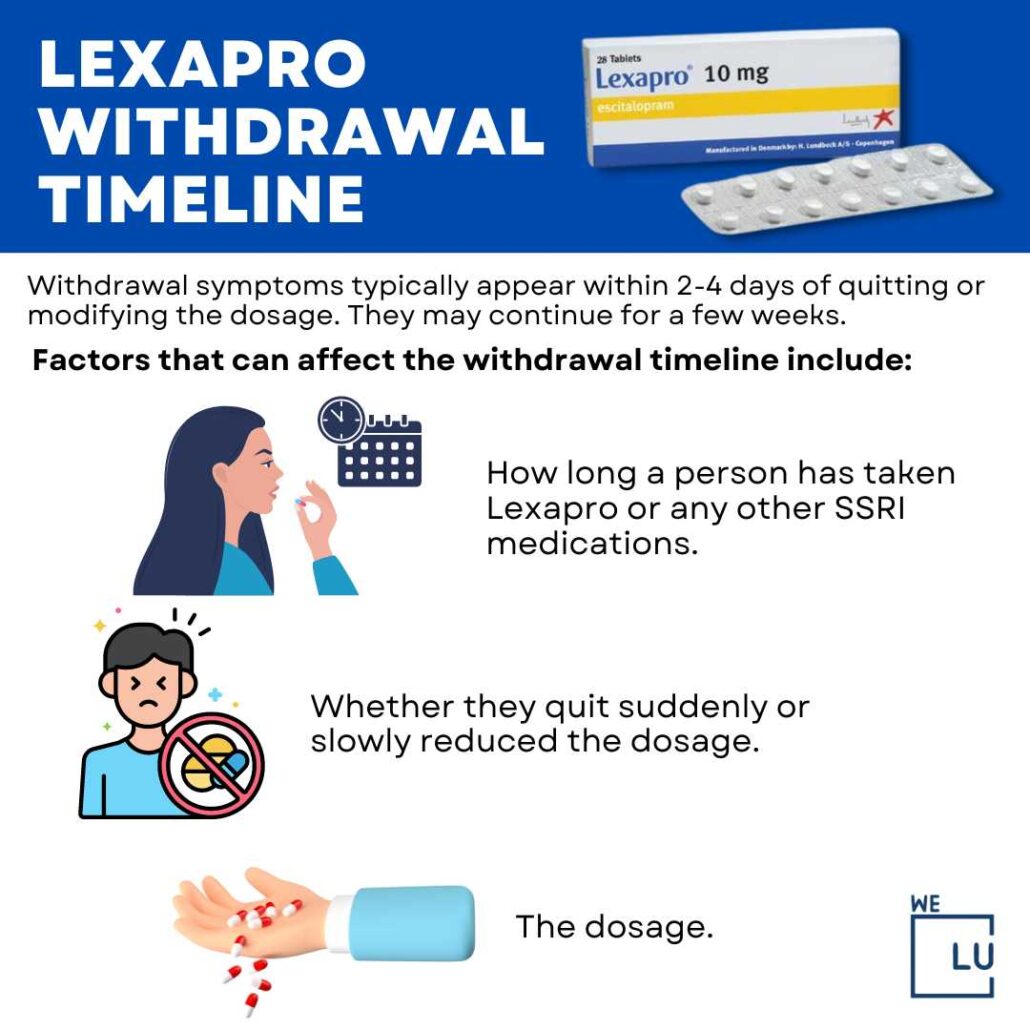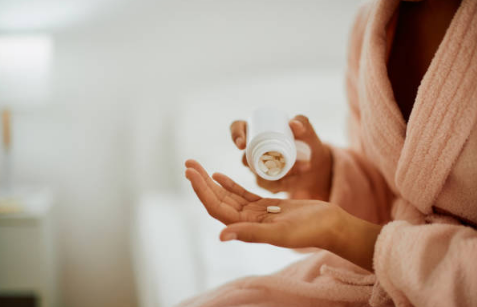We Level Up FL Treatment Center | Editor Yamilla Francese | Clinically Reviewed By Lauren Barry, LMFT, MCAP, QS, Director of Quality Assurance | Editorial Policy | Research Policy | Last Updated: August 7, 2023
Best Time to Take Lexapro for Anxiety
Determining the best time to take Lexapro for anxiety can vary depending on individual factors and personal preferences. In general, it is recommended to take Lexapro at the same time every day to establish a consistent routine. Some people find taking it in the morning helpful, as it can boost energy and reduce the risk of insomnia. However, others may prefer taking it in the evening to minimize any potential side effects during the day. The best time to take Lexapro for anxiety should be discussed with a healthcare provider, who can consider an individual’s response, lifestyle, and potential interactions with other medications.
Symptoms of Using Lexapro for Anxiety
- Nausea: One of the most common side effects of Lexapro is nausea. It may range from mild discomfort to more pronounced queasiness or an upset stomach.
- Headache: Headaches can occur as a side effect of Lexapro use. They can range from mild to moderate in intensity.
- Dizziness: Some individuals may experience dizziness or lightheadedness, especially when standing up quickly. It is advisable to be cautious and avoid activities requiring alertness until these sensations subside.
- Insomnia or drowsiness: Lexapro can affect sleep patterns. While some individuals may experience difficulty sleeping or insomnia, others may feel drowsy or have increased fatigue.
- Sexual side effects: A common side effect of Lexapro and other SSRIs is a potential impact on sexual functioning. This can manifest as decreased libido (sex drive), difficulty achieving orgasm, or erectile dysfunction in men.
- Gastrointestinal issues: Lexapro may cause gastrointestinal symptoms such as diarrhea or constipation.
- Sweating: Some individuals may experience increased sweating while using Lexapro.
- Weight changes: Lexapro use has been associated with weight gain and weight loss in some individuals.
- Mood changes: While Lexapro is primarily used to improve mood, in some cases, it can cause mood swings, irritability, or anxiety.
- Dry mouth: Lexapro can lead to a dry mouth sensation, which may be alleviated by staying hydrated and using sugar-free candies or gum.


Skip To:
Learn More:
Get Help. Get Better. Get Your Life Back.
Searching for Accredited Dual Diagnosis Mental Health Centers Near You?
Even if therapy failed previously, or are in the middle of a difficult crisis, we stand ready to support you. Our trusted behavioral health specialists will not give up on you. When you feel ready or just want someone to speak to about counseling alternatives to change your life call us. Even if we cannot assist you, we will lead you to wherever you can get support. There is no obligation. Call our hotline today.
FREE 24/7 Dual Diagnosis Mental Health Services HotlineAnxiety and Lexapro Fact Sheet
What is Anxiety?
- Anxiety is a normal and often temporary response to stress or a perceived threat.
- It involves feelings of unease, worry, fear, or apprehension.
- Anxiety becomes a concern when it is persistent, excessive, and interferes with daily life.
Types of Anxiety Disorders:
- Generalized Anxiety Disorder (GAD):
- Characterized by excessive, uncontrollable worry and anxiety about various aspects of life.
- Symptoms may include restlessness, irritability, muscle tension, fatigue, and difficulty concentrating.
- Panic Disorder:
- It involves recurrent and unexpected panic attacks and intense periods of fear or discomfort.
- Panic attacks can cause a rapid heartbeat, sweating, shortness of breath, chest pain, and a sense of impending doom.
3. Social Anxiety Disorder (SAD):
- It involves an intense fear of social situations and being judged or embarrassed.
- People with SAD may avoid social interactions, leading to significant distress and impairment.
4. Obsessive-Compulsive Disorder (OCD):
- Characterized by intrusive thoughts (obsessions) and repetitive behaviors (compulsions) performed to alleviate anxiety.
- OCD can interfere with daily activities and cause significant distress.
10 vs 20 mg for Lexapro Anxiety
When it comes to the dosage of Lexapro (escitalopram) for anxiety, the appropriate dose can vary depending on individual factors such as the severity of symptoms, individual response, and the recommendation of a healthcare professional. The typical range for Lexapro dosage in the treatment of anxiety is between 10 to 20 mg per day.
Anxiety and Lexapro Statistics
Anxiety is a common mental health condition characterized by excessive worry, fear, and apprehension. It can manifest in various forms, such as generalized anxiety disorder (GAD), panic disorder, social anxiety disorder, and specific phobias. Anxiety can significantly impact a person’s daily life, relationships, and well-being. Lexapro is a commonly prescribed medication for individuals struggling with anxiety. It is known for its effectiveness in alleviating symptoms and relieving those dealing with anxiety disorders.
264 million
An estimated 264 million people globally were living with anxiety disorders in 2017.
Source: WHO
50%
Depression and anxiety frequently coexist. 50% of people with anxiety disorders develop depression.
Source: ADAA
$42 billion
Anxiety disorders cost more than $42 billion annually in healthcare expenses and lost productivity in the United States.
Source: Journal of Clinical Psychiatry
When Is The Best Time To Take Lexapro For Anxiety?
The best time to take Lexapro (Escitalopram) for anxiety typically depends on your response to the medication and any specific instructions provided by your healthcare provider. However, it is often recommended to take Lexapro once daily, either in the morning or evening.
Here are some considerations regarding the timing of Lexapro intake for anxiety:
- Consistency: Take Lexapro at the same time every day to maintain consistent levels of the medication in your system, which can enhance its effectiveness.
- Morning Dosing: Some individuals find that taking Lexapro in the morning helps boost energy and mood throughout the day. It may also reduce the likelihood of interference with sleep, as insomnia is a potential side effect for some people.
- Evening Dosing: Others prefer taking Lexapro in the evening because it can help promote relaxation and mitigate daytime drowsiness. Plus, it may be more convenient for individuals who experience sleep disturbances with the medication.
- Personal Preference: Ultimately, the best time to take Lexapro for anxiety depends on your preference and any specific side effects you may experience. If you are unsure about the timing, discuss it with your healthcare provider, who can help tailor the dosing schedule to your needs.
- Follow your healthcare provider’s instructions: Always follow your healthcare provider’s instructions regarding the dosage and timing of Lexapro intake. They will consider your medical history, other medications you may be taking, and individual responses to Lexapro to provide your best recommendations.
Remember that it may take several weeks for Lexapro to reach its full therapeutic effect, so it’s essential to be patient and consistent with your medication regimen. If you have any concerns or experience unusual side effects while taking Lexapro, don’t hesitate to contact your healthcare provider for guidance.
Lexapro for Anxiety
One of the advantages of Lexapro is its ability to address anxiety and depression. It is often prescribed for individuals who experience both conditions simultaneously, providing a dual benefit. By targeting the chemical imbalances in the brain, Lexapro helps regulate mood and reduce anxiety symptoms. When using Lexapro for anxiety, finding the correct dosage is crucial. A lower starting dose is often recommended to minimize potential side effects, with the dosage gradually increasing if necessary. Doctors closely monitor their patient’s progress to ensure optimal results.
Lexapro’s effectiveness is also evident in the positive feedback from patients. Many individuals have reported significantly reduced anxiety levels, improved sleep patterns, and improved quality of life while taking Lexapro. However, it’s important to note that individual responses may vary, and it may take some time to find the correct dosage that works best for each person.
While Lexapro is generally well tolerated, some individuals may experience side effects such as nausea, dizziness, or changes in appetite.


End the Emotional Pain. Get Your Life Back.
Feeling Depressed, Anxious or Struggling with Mental Health Illness? Get Safe Comfortable Mental Health Dual Diagnosis High-Quality Therapy From Counselors That Care. Begin Your Recovery Now.
Hotline (855) 940-612510 vs 20 mg Lexapro Anxiety
The choice between 10 mg and 20 mg of Lexapro for anxiety treatment depends on various factors, including the severity of the anxiety, individual response to the medication, and guidance from a healthcare professional. Here’s a brief comparison:
- 10 mg Lexapro: This is a typical starting dose for anxiety treatment. It is usually prescribed to assess how well an individual responds to the medication and to minimize the risk of side effects. Many people find 10 mg to be effective in managing their anxiety symptoms.
- 20 mg Lexapro: If the initial 10 mg dose does not relieve symptoms, a healthcare provider may consider increasing the dosage to 20 mg. This higher dose is more potent and may be necessary for individuals with more severe or treatment-resistant anxiety.
It’s crucial to follow your healthcare provider’s instructions regarding Lexapro dosage adjustments. They will consider your specific situation, response to the medication, and potential side effects to determine the appropriate dose for you. Avoid self-adjusting the dosage without consulting your healthcare provider, as abrupt changes in dosage can lead to adverse effects or reduced efficacy.
Lexapro vs Zoloft for Anxiety
| Feature | Lexapro | Zoloft |
|---|---|---|
| Drug Name | Escitalopram (Lexapro) | Sertraline (Zoloft) |
| Brand Names | Lexapro, Cipralex | Zoloft, Lustral, and Serlain |
| FDA Approval | Approved for anxiety | Approved for anxiety |
| Mechanism of Action | Selective Serotonin Reuptake Inhibitor (SSRI) | Selective Serotonin Reuptake Inhibitor (SSRI) |
| Indicated for | Generalized anxiety disorder, social anxiety disorder, and panic disorder | Generalized anxiety disorder, social anxiety disorder, panic disorder, obsessive-compulsive disorder, and post-traumatic stress disorder |
| Common Side Effects | – Nausea | – Nausea |
| – Headache | – Headache | |
| – Dry mouth | – Dry mouth | |
| – Drowsiness | – Drowsiness | |
| – Insomnia | – Insomnia | |
| – Sexual dysfunction | – Sexual dysfunction | |
| Dosage Forms | – Tablets | – Tablets |
| – Oral solution | – Oral solution | |
| – Disintegrating tablets | – Disintegrating tablets | |
| Dosage Frequency | Usually once daily | Usually once daily |
| Half-Life | Approximately 27–32 hours | Approximately 25 hours |
| Interactions | Avoid MAOIs | Avoid MAOIs |
| Certain medications may interact, consult with a healthcare provider before use | Certain medications may interact; consult with a healthcare provider before use | |
| Precautions | – Risk of suicidal thoughts in children, adolescents, and young adults | – Risk of suicidal thoughts in children, adolescents, and young adults |
| – Gradual tapering when discontinuing treatment is recommended | – Gradual tapering when discontinuing treatment is recommended | |
| – Not recommended during pregnancy unless benefits outweigh risks | Certain medications may interact; consult with a healthcare provider before use | |
| – Caution in individuals with liver or kidney problems | – Caution in individuals with liver or kidney problems | |
| – Avoid alcohol and other CNS depressants | – Avoid alcohol and other CNS depressants | |
| – May cause dizziness or drowsiness; use caution when operating machinery | – May cause dizziness or drowsiness; use caution when operating machinery |
Please note that this table is for informational purposes only and should not replace professional medical advice. If you are considering medication for anxiety, it’s essential to consult with a healthcare provider to determine the most appropriate treatment for your specific needs and medical history.
First-class Facilities & Amenities
World-class High-Quality Mental Health Services & Behavioral Health Substance Abuse Treatment
Rehab Centers TourRenowned Mental Health Centers. Serene Private Facilities. Inpatient Rehab Programs Vary.
Mental Health Helpline (855) 940-6125Proven recovery success experience, backed by a Team w/ History of:
15+
Years of Unified Experience
100s
5-Star Reviews Across Our Centers
10K
Recovery Successes
- Comprehensive Dual-Diagnosis Treatment
- Complimentary Family & Alumni Programs
- Coaching, Recovery & Development Events
- Comfortable Onsite Medical Detox Center
Maximum Dose of Lexapro for Anxiety

The initial dose of Lexapro for anxiety is often lower, typically starting at 10 mg daily. This allows the individual to adjust to the medication and minimizes the potential for side effects. If necessary, the prescribing healthcare professional may gradually increase the dosage based on the individual’s response and needs.
The initial dose of Lexapro for anxiety is often lower, typically starting at 10 mg daily. This allows the individual to adjust to the medication and minimizes the potential for side effects. If necessary, the prescribing healthcare professional may gradually increase the dosage based on the individual’s response and needs.
Lexapro vs Prozac for Anxiety
| Feature | Lexapro | Prozac |
|---|---|---|
| Drug Name | Escitalopram (Lexapro) | Fluoxetine (Prozac) |
| Brand Names | Lexapro, Cipralex | Prozac, Sarafem, Rapiflux, Selfemra |
| FDA Approval | Approved for anxiety | Approved for anxiety |
| Mechanism of Action | Selective Serotonin Reuptake Inhibitor (SSRI) | Selective Serotonin Reuptake Inhibitor (SSRI) |
| Indicated for | Generalized anxiety disorder, social anxiety disorder, panic disorder | Generalized anxiety disorder, social anxiety disorder, panic disorder, obsessive-compulsive disorder, and bulimia nervosa |
| Common Side Effects | – Nausea | – Nausea |
| – Headache | – Headache | |
| – Dry mouth | – Dry mouth | |
| – Drowsiness | – Drowsiness | |
| – Insomnia | – Insomnia | |
| – Sexual dysfunction | – Sexual dysfunction | |
| Dosage Forms | – Tablets | – Capsules |
| – Oral solution | – Delayed-release capsules | |
| Dosage Frequency | Usually once daily | Usually once daily |
| Half-Life | Approximately 27-32 hours | Approximately 4-6 days |
| Interactions | Avoid MAOIs | Avoid MAOIs |
| Certain medications may interact, consult with healthcare provider before use | Certain medications may interact, consult with healthcare provider before use | |
| Precautions | – Risk of suicidal thoughts in children, adolescents, and young adults | – Risk of suicidal thoughts in children, adolescents, and young adults |
| – Gradual tapering when discontinuing treatment is recommended | – Gradual tapering when discontinuing treatment is recommended | |
| – Not recommended during pregnancy unless benefits outweigh risks | – Not recommended during pregnancy unless benefits outweigh risks | |
| – Caution in individuals with liver or kidney problems | – Caution in individuals with liver or kidney problems | |
| – Avoid alcohol and other CNS depressants | – Avoid alcohol and other CNS depressants | |
| – May cause dizziness or drowsiness, caution when operating machinery | – May cause dizziness or drowsiness, caution when operating machinery |
Lexapro vs Prozac for Anxiety
Please remember that this table is for informational purposes only and should not replace professional medical advice. If you are considering medication for anxiety, it’s essential to consult with a healthcare provider to determine the most appropriate treatment for your specific needs and medical history.
World-class, Accredited, 5-Star Reviewed, Effective Mental Health Dual Diagnosis Programs. Complete Integrated Inpatient Rehab with Free Post Discharge Therapy Planning.
CALL (855) 940-6125End the Emotional Pain Rollercoaster. Gain Stability & Happiness Through Recovery Treatment. Start Mental Health Counseling Today. Get Free No-obligation Guidance by Behaviroal Health Specialists Who Understand Mental Health Recovery.
Does Lexapro Help with Anxiety?
Yes, Lexapro (generic name: Escitalopram) is a selective serotonin reuptake inhibitor (SSRI) antidepressant that the FDA has approved for treating anxiety disorders. It is commonly prescribed for generalized anxiety disorder (GAD), social anxiety, and panic disorder.
The mechanism of action for Lexapro involves increasing the levels of serotonin, a neurotransmitter in the brain that helps regulate mood and emotions. By doing so, it can alleviate the symptoms of anxiety and improve overall well-being.
Splitting Lexapro doses should be done only under the guidance of your healthcare provider. SSRIs like Lexapro are typically designed for once-daily dosing. Changing the dosing schedule without professional advice may affect its effectiveness.

Experience Transformative Recovery at the We Level Up Treatment Center.
See our authentic success stories. Get inspired. Get the help you deserve.



Start a New Life
Begin with a free call to a behavioral health treatment advisor. Learn more about our dual-diagnosis programs. The We Level Up treatment center network delivers recovery programs that vary by each treatment facility. Call to learn more.
- Personalized Care
- Caring Accountable Staff
- World-class Amenities
- Licensed & Accredited
- Renowned w/ 5-Star Reviews
We’ll Call You
Anxiety Treatment at We Level Up WA
The choice between other anxiety prescriptions depends on individual factors, including the specific anxiety disorder, previous treatment response, side effect profile, and personal preferences. Consulting with a healthcare provider is crucial in determining the most appropriate medication and dosage for your anxiety disorder. They can evaluate your situation and guide you in making an informed decision.
Contact We Level Up Washington mental health treatment center for more information. Our mental health specialists can help you explore treatment options and provide further resources.
Popular Lexapro for Anxiety FAQs
-
Does Lexapro help with anxiety?
Yes, Lexapro (escitalopram) is commonly prescribed to help manage anxiety. As a selective serotonin reuptake inhibitor (SSRI), Lexapro works by increasing serotonin levels in the brain. Serotonin is a neurotransmitter that is crucial in regulating mood and emotions.
-
Can Lexapro cause anxiety?
In rare cases, Lexapro (escitalopram) can cause a paradoxical reaction that may increase anxiety symptoms instead of reducing them. While this is not a common side effect, being aware of this possibility is crucial.
-
Is Lexapro for anxiety or depression?
Lexapro (escitalopram) is a medication commonly prescribed for anxiety and depression. It belongs to selective serotonin reuptake inhibitors (SSRIs), widely used to treat various mental health conditions.
Powerful Coping Skills for Anxiety. Top Mental Health and Anxiety Tips. Advice from a Therapist.
Search Drug & Alcohol Rehab / Detox & Mental Health When Is The Best Time To Take Lexapro For Anxiety? Topics & Resources
Sources
- National Institute of Mental Health – “Anxiety Disorders” Link: https://www.nimh.nih.gov/health/topics/anxiety-disorders/index.shtml
- Centers for Disease Control and Prevention (CDC) – “Mental Health – Anxiety and Depression” Link: https://www.cdc.gov/mentalhealth/learn/index.htm
- National Heart, Lung, and Blood Institute – “Coping With Stress and Anxiety” Link: https://www.nhlbi.nih.gov/health-topics/coping-with-stress-and-anxiety
- MedlinePlus – “Anxiety” Link: https://medlineplus.gov/anxiety.html
- Substance Abuse and Mental Health Services Administration (SAMHSA) – “Anxiety Disorders” Link: https://www.samhsa.gov/conditions/anxiety-disorders
- National Institute on Aging – “Anxiety Disorders in Older Adults” Link: https://www.nia.nih.gov/health/anxiety-disorders-older-adults
- Office on Women’s Health – “Anxiety Disorders” Link: https://www.womenshealth.gov/mental-health/mental-health-conditions/anxiety-disorders
- National Center for Complementary and Integrative Health – “Anxiety” Link: https://www.nccih.nih.gov/health/anxiety-at-a-glance
- U.S. Department of Veterans Affairs – “Anxiety Disorders” Link: https://www.mentalhealth.va.gov/anxiety.asp
- National Library of Medicine – “Anxiety” Link: https://medlineplus.gov/anxiety.html